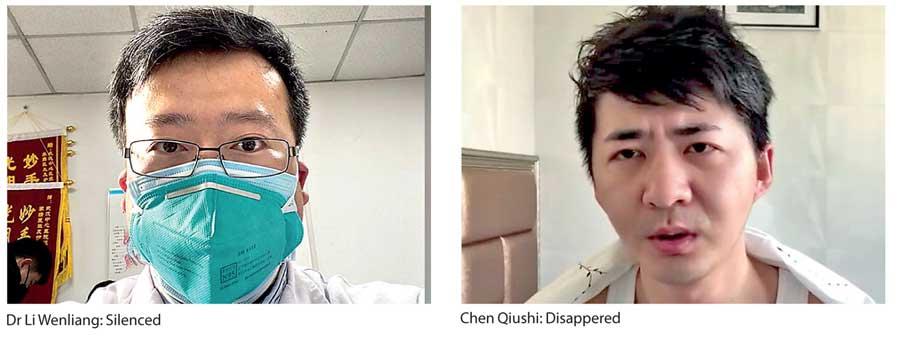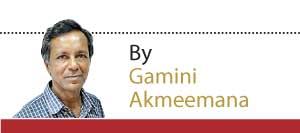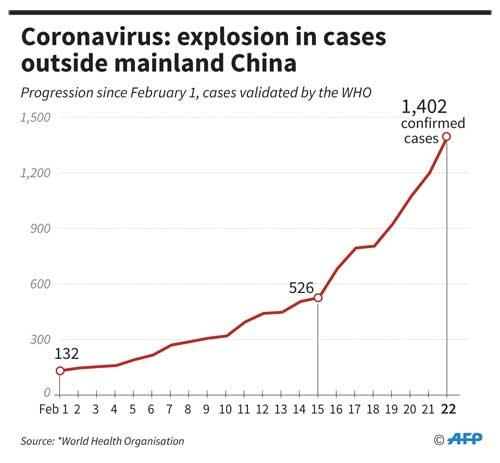24 Feb 2020 - {{hitsCtrl.values.hits}}

The Coronavirus (CoV) outbreak will eventually be brought under control, and hopefully sooner than expected, but it has brought attention to a darker side of China’s carefully manipulated State-sponsored image of the world’s fastest-growing mega State, whose population is content to be free-spending globetrotters when they are not working and earning. 
But the death of a whistleblowing doctor, and the disappearance of a citizen journalist who reported from the heart of the Coronavirus outbreak, have cast a pall over this happy
official picture.
Dr Li Wenliang, an Ophthalmologist at the Wuhan Central Hospital, died on February 7.
Li, 34, was possibly the first to warn colleagues in late December about a mysterious virus (Not yet identified as the Coronavirus epidemic). But his warnings were not heeded, and he was detained by the Police on January 3 and accused of “spreading false rumours.”
He was forced to sign a Police document admitting he had breached the law and had “seriously disrupted social order.”
But his worst fears came true within days as the epidemic spread all over the world and has now claimed more than 1,300 people, mostly in China.
Before he died, Dr Li told the Chinese media tellingly that silencing those who tell the truth was what makes a country sick. “I think there should be more than one voice in a healthy society,” he said.
His death sparked widespread outrage, but Chinese authorities do not agree. Fearing that the backlash could spark street protests, the government quickly deleted posts from sites such as Weibo, China’s Twitter-like microblog, calling for action.
A post forwarded on Wechat but now deleted said: “I hope one day we can stand on the street holding Li Wenliang’s picture.”
His death became the main top on Weibo, with more than 1.5 billion views, and was also heavily discussed in private Wechat messaging groups. Even blog posts from state media outlets mourned his death and issued veiled attacks on the Wuhan officials who censured him.
“They owe you an apology, we owe you our gratitude. Take care, Dr Li,” said a Weibo post from Xiakaedo, an account under the overseas edition of the Communist Party’s People’s Daily.
But none of this seems to have softened the official hard-line on media freedom and personal expression. Chen Qiushi, a human rights advocate and one of a group of citizen journalists countering the official reporting on the epidemic, went missing around the time Dr Li Wenliang died.
Chen went to visit a hospital and did not return home. Friends and family have not heard from him since, According to Chen’s mother, he has been forcibly quarantined.
Chen has more than 200,000 followers on Twitter and more than 400,000 subscribers to his Youtube Channel. Since the epidemic began, he has been visiting hospitals regularly, talking to patients and doctors and making videos. His internet supporters accused the government of trying to silence citizens trying to give a realistic picture of what was happening in Wuhan, the epicentre of the outbreak. Many such comments seem to have been deleted from Weibo.
“Chen Qiushi cannot become another Li Wenliang! China must let people speak out,” one such comment stated.
“There are no superheroes in this world, just regular people who stand up.”
"Chinese leaders seem to believe that economic prosperity will keep their population politically content in the long run"
There is widespread shock and outrage that Dr Li Wenliang died with the charge of rumour-mongering still on his police file, and nearly two million Chinese citizens voiced their views after his death on a hashtag (#) called “I want the freedom of speech” before it was deleted by censors.
China’s human rights record is highly questionable and it asks no questions when giving development aid to countries in Asia, the Middle East and Africa. It isn’t just that Chinese citizens are detained, abused and often held incommunicado.
Those living abroad (especially in Thailand) have been abducted. In late 2015, the Causeway Bay Books disappearances began with the disappearance in Thailand of Gui Minhai, Chinese-born Swedish scholar, writer and book publisher.
 Between Oct-Dec. 2015, five staff members of a bookstore called Causeway Bay books in Hong Kong went missing. Chinese television later showed them saying that they had entered China voluntarily, but this was widely dismissed as a forced appearance. The bookstore sold books considered politically sensitive in mainland China. According to the website Human Rights In China (HRIC), there are many other relatively low-profile cases in China. In a story filed on July 14, 2015, it states that Chinese authorities have disappeared, detained or questioned in less than a week at least 159 lawyers and activists throughout China. The lawyers, including Wang Yu, Zhou Shifeng, Li Heping and Sui Muqing, are known for their human rights work. They have represented clients facing religious persecution, forced evictions and rights activities. A news report dated October 2018 says how workers campaigning to form an independent union at the factory of Jasic Technology in Shenzhen were attacked and intimidated. Authorities seized 18 supporters in five cities including Beijing. Zhang Shengye, a graduate from Peking University, was assaulted and abducted from the campus. While some of those detained were released subsequently, 32 people are still detained, disappeared, or put under “residential surveillance in a designated place.”
Between Oct-Dec. 2015, five staff members of a bookstore called Causeway Bay books in Hong Kong went missing. Chinese television later showed them saying that they had entered China voluntarily, but this was widely dismissed as a forced appearance. The bookstore sold books considered politically sensitive in mainland China. According to the website Human Rights In China (HRIC), there are many other relatively low-profile cases in China. In a story filed on July 14, 2015, it states that Chinese authorities have disappeared, detained or questioned in less than a week at least 159 lawyers and activists throughout China. The lawyers, including Wang Yu, Zhou Shifeng, Li Heping and Sui Muqing, are known for their human rights work. They have represented clients facing religious persecution, forced evictions and rights activities. A news report dated October 2018 says how workers campaigning to form an independent union at the factory of Jasic Technology in Shenzhen were attacked and intimidated. Authorities seized 18 supporters in five cities including Beijing. Zhang Shengye, a graduate from Peking University, was assaulted and abducted from the campus. While some of those detained were released subsequently, 32 people are still detained, disappeared, or put under “residential surveillance in a designated place.”
In another report dated October 15, 2017, Tong Liya and former husband Han Zhongming, a Shanghai rights defender who petitioned and then sued the government over being forcibly evicted and relocated, were followed for 24 hours and watched in the streets by eight unidentified non-locals. Hans went missing after two weeks. The Police refused to take the case.
According to HRIC, districts in Shanghai have been hiring unemployed non-locals as security officers or ‘auxiliary’ Police. The government gives them an open hand when problems arise, and the police turn a blind eye. Since Xi Jinping became president of China, the government has become increasingly hardline and authoritarian. But if it believes that economic prosperity alone will be enough to keep the status quo, it is mistaken. Despite the impressive economic performance, China is a country of great inequalities. In the ex-USSR, the Soviet government tried to hold things together with increasing police surveillance. As the economy stagnated, Mikhail Gorbachev succeeded Constantin Chernenko as Soviet leader and tried to revive the economy through Perestroika. But the politburo blocked his reforms, and he took the radical step of disbanding the Soviet Union.
Chinese leaders seem to believe that unprecedented economic prosperity will keep their vast population politically content in the long run.
The average Chinese citizen enjoys today a living standard and buying power that Soviet citizens could only dream of in the 1980s. But, in today’s fast-changing world, greater economic prosperity and mobility unleashes a new boldness when it comes to personal expression and freedom of speech.
The day when China’s leaders will have to wake up to this reality isn’t far off. Hopefully, the man in charge in Beijing will act as wisely and humanely as Mikhail Gorbachev did in 1991 when the decisive moment presents itself.
19 Apr 2024 19 minute ago
19 Apr 2024 2 hours ago
19 Apr 2024 2 hours ago
19 Apr 2024 2 hours ago
19 Apr 2024 2 hours ago